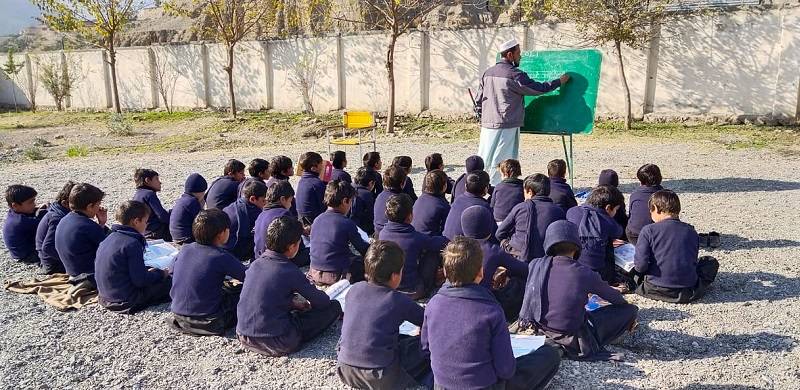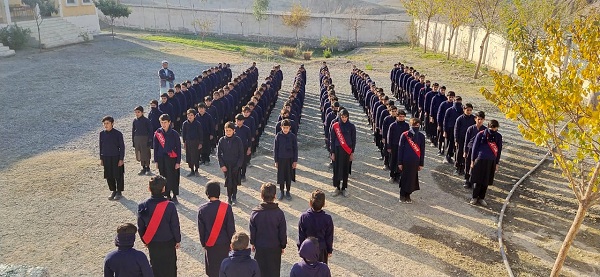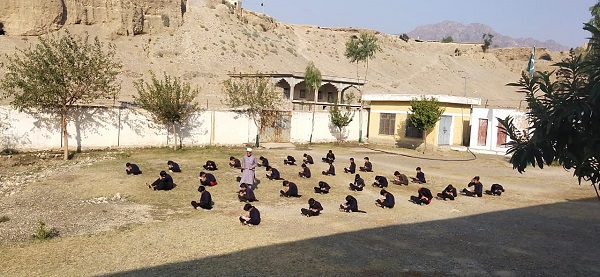
“Those lacking in vision should not join a teaching job. An educator, in fact, is the agent of change in the society and if they do their task correct, it is inevitable for them to change everything that comes in their way, says Zamarli Shah a primary school teacher in the remote Tirah valley, district Khyber.
Shah, who has been working as Primary School Head Teacher (PSHT) in the remote Tirah valley, district Khyber, for the last 15 years or more, spared some moments to talk with this scribe. He poured out his head and heart about his tough journey and the hardships that he has been through during his risky career. The conflict between fundamentalist militants and state authorities had its impact on his life too.
 “In my initial days of my service, I used to live under constant threat of being attacked by militants. But time and again I walked to local community and tried to convince them about the benefits of education of both boys and girls. Sometimes I would feel as though I were drawing their wrath on me, but then a few would take my side and mostly I would win the argument,” Mr. Shah recalls.
“In my initial days of my service, I used to live under constant threat of being attacked by militants. But time and again I walked to local community and tried to convince them about the benefits of education of both boys and girls. Sometimes I would feel as though I were drawing their wrath on me, but then a few would take my side and mostly I would win the argument,” Mr. Shah recalls.
After receiving his masters in political science from Peshawar University, he joined the teaching profession with the aim of bringing about a change in the tribal areas plagued by endless war for over several decades. He was deputed to a newly built government school in Bazar Zakhakhel locality, Sra Shaga Malak Nabat Khan Kallay, some 70 km away from main Landikotal subdivision of district Khyber.
“It was 2007 when schools across Khyber Pakhtunkhwa, including the tribal areas, used to be bombed and teachers especially female teachers either threatened or killed. Being inexperienced, for me the situation was even a nightmare but I was determined to strengthen my footing. I approached the local community to send out their children to study. My door-to-door campaign in the area paved the way for me and after a few days, parents felt more secure,” Shah narrates.
Though the school was under construction and basic facilities – for instance a washroom or even a wall boundary –`were still missing but he did not care. He preferred staying as a guest after school time at the Hujra of local Malak. He had a rare opportunity to share his views with the residents on the importance of education.
“After years of struggle, the same school stands prominent in the area, comprising two rooms and one teacher for over 300 students from grades one to six. I teach seven to eight subjects. My students can read and write Urdu and English fluently, and they are also well versed in other subjects. Lessons on environment and cleanliness and physical fitness are given in addition to the routine lessons,” he states.
Talking about the response of the local community, Shah says that parents were pleased with visible changes in the behaviour of their kids and wanted more educational facilities for their children. He says that out of 38 educational facilities for girls and boys, 20 are being run with one teacher only. Recently, the KP education department has pledged its approval of more teaching staff along with other facilities.
“I give weekly tests to students on general knowledge, language, art, drawing and mathematics and I get an excellent response from them. Coming from poor backgrounds, they are very intelligent and their pickup power is extraordinary. Also, I arrange occasionally food, sports and cultural galas for improving the overall development of the kids. The children are respectful and seen taking care of wildlife and plants around them. They are longing to continue their education as most want to become doctors, engineers and join the armed forces to work for their people and land,” Zarmali Shah concludes.
Shah, who has been working as Primary School Head Teacher (PSHT) in the remote Tirah valley, district Khyber, for the last 15 years or more, spared some moments to talk with this scribe. He poured out his head and heart about his tough journey and the hardships that he has been through during his risky career. The conflict between fundamentalist militants and state authorities had its impact on his life too.
 “In my initial days of my service, I used to live under constant threat of being attacked by militants. But time and again I walked to local community and tried to convince them about the benefits of education of both boys and girls. Sometimes I would feel as though I were drawing their wrath on me, but then a few would take my side and mostly I would win the argument,” Mr. Shah recalls.
“In my initial days of my service, I used to live under constant threat of being attacked by militants. But time and again I walked to local community and tried to convince them about the benefits of education of both boys and girls. Sometimes I would feel as though I were drawing their wrath on me, but then a few would take my side and mostly I would win the argument,” Mr. Shah recalls.After receiving his masters in political science from Peshawar University, he joined the teaching profession with the aim of bringing about a change in the tribal areas plagued by endless war for over several decades. He was deputed to a newly built government school in Bazar Zakhakhel locality, Sra Shaga Malak Nabat Khan Kallay, some 70 km away from main Landikotal subdivision of district Khyber.
“It was 2007 when schools across Khyber Pakhtunkhwa, including the tribal areas, used to be bombed and teachers especially female teachers either threatened or killed. Being inexperienced, for me the situation was even a nightmare but I was determined to strengthen my footing. I approached the local community to send out their children to study. My door-to-door campaign in the area paved the way for me and after a few days, parents felt more secure,” Shah narrates.
Though the school was under construction and basic facilities – for instance a washroom or even a wall boundary –`were still missing but he did not care. He preferred staying as a guest after school time at the Hujra of local Malak. He had a rare opportunity to share his views with the residents on the importance of education.

“After years of struggle, the same school stands prominent in the area, comprising two rooms and one teacher for over 300 students from grades one to six. I teach seven to eight subjects. My students can read and write Urdu and English fluently, and they are also well versed in other subjects. Lessons on environment and cleanliness and physical fitness are given in addition to the routine lessons,” he states.
Talking about the response of the local community, Shah says that parents were pleased with visible changes in the behaviour of their kids and wanted more educational facilities for their children. He says that out of 38 educational facilities for girls and boys, 20 are being run with one teacher only. Recently, the KP education department has pledged its approval of more teaching staff along with other facilities.
“I give weekly tests to students on general knowledge, language, art, drawing and mathematics and I get an excellent response from them. Coming from poor backgrounds, they are very intelligent and their pickup power is extraordinary. Also, I arrange occasionally food, sports and cultural galas for improving the overall development of the kids. The children are respectful and seen taking care of wildlife and plants around them. They are longing to continue their education as most want to become doctors, engineers and join the armed forces to work for their people and land,” Zarmali Shah concludes.

